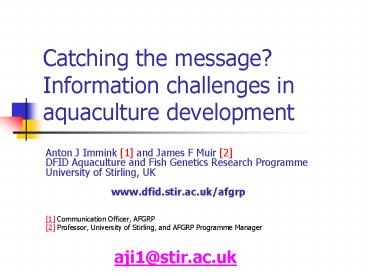Catching the message Information challenges in aquaculture development PowerPoint PPT Presentation
1 / 17
Title: Catching the message Information challenges in aquaculture development
1
Catching the message? Information challenges in
aquaculture development
- Anton J Immink 1 and James F Muir 2
- DFID Aquaculture and Fish Genetics Research
Programme University of Stirling, UK - www.dfid.stir.ac.uk/afgrp
- 1 Communication Officer, AFGRP
- 2 Professor, University of Stirling, and AFGRP
Programme Manager
aji1_at_stir.ac.uk
2
- www.dfid.stir.ac.uk
Seed
Limited water
The Seed theme brings together knowledge on
broodstock management, selective breeding and
social aspects of seed production and delivery
networks, particularly relating to juvenile fish
production in rice fields.
Projects under this theme include studies into
the role of aquaculture in irrigation systems,
the role of self-recruiting species in the
livelihoods of the poor, marketing studies and
options to improve the sustainability of brackish
water aquaculture systems.
Aquaculture and Fish Genetics Research Programme
- AFGRP
Aquatic animal health
AFGRP has delivered a number of crucial technical
solutions to aquatic animal health issues that
affect production of aquatic
animals in developing countries. A key focus is
to ensure that this research has maximum benefit
for the poor.
3
Overview of AFGRP experience
- Programme history operating env.
- Livelihoods focus
- Dissemination thrust
- Novel examples of field level dissemination
- Challenges for the future
4
Programme History
- Centralised research -gt Renewable Natural
Resources Research Strategy - 11 programmes covering crops, livestock, forestry
and fisheries - UK expertise to assist developing countries -
top-down approach - No provision for capacity building
5
Programme History
- 1997 DFID White Paper, change to livelihoods
approach and poverty focus - Get scientists out of the labs (and field labs)
and into the field with farmers - Shift the research out of the UK into appropriate
field locations
6
Livelihoods shift
- Specific solutions, but replicable?
- Away from strategic
- (environmental/social replication?)
- Targeted to the poorest
- producers, employees, consumers
- Participation really?
- identifying research needs/solve together
- Action research
- partner and farmer roles
7
Dissemination thrust
- 2000 with MDG setting and increased focus on
impact - Livelihoods research gathered strength
- First full findings of SL emerge
- Audience shift from DFID/Govt extension/other
researchers to farmers/ NGOs/other donors/policy
makers
8
Impact on dissemination
- Material shift from peer-reviewed papers to
manuals/posters/policy briefs - Content shift to less hard facts and more case
study stories - Increased emphasis on the role and experience of
developing country partners to communicate with
farmers to policy makers
9
Macro-change in dissemination pathways
- Classical reliance on extension services
- assumed to be looking for information
- Typical structural readjustment
- Decentralisation
- Shift to project responsibility
- Classical question of where aquaculture falls
(agriculture or fisheries)
10
How is information accessed?
- Information access surveys
- Networks, trust
- Kinship, commercial, independent
- Radio, word of mouth, posters (very unusual
outputs for scientists)
11
Tested opportunities
- Fry traders
- Selling a product
- Rickshaw pullers
- Chatting with clients
- Child to child (and child to parent)
- Discussions at home, involvement in production
12
Decentralised libraries?
- Village information and service centres
- External information
- Locally developed
- Interested farmers and service providers
- Poorest will pay
- Local (accessible) and immediate
13
Other tested opportunities
- Radio interviews
- Television programmes
- Newspaper articles
- Policy briefs
- Drama
- The Aquaculture Compendium
Mass media
Targeted
14
What impact?
- Shift from classic research output focus
- Reaching specific groups through targeted
approaches - Reaching general public through mass media
- New (long-term) partnerships
- More time spent managing partnerships and diverse
dissemination activities
15
Challenges
- More grey literature
- How do we record/maintain this?
- AFGRP website / DFID repository / AC
- Decentralised libraries
- Following change in extension provision?
16
The future
- New DFID SRSA
- a requirement for dynamic information centres?
- Continued focus on MDGs drawing research further
into development domain - Growing demand for diverse output formats and
delivery mechanisms
17
Catching the message? Information challenges in
aquaculture development
THANK YOU
- Anton J Immink and James F Muir
- DFID Aquaculture and Fish Genetics Research
Programme University of Stirling, UK - www.dfid.stir.ac.uk/afgrp

